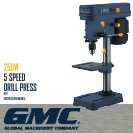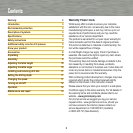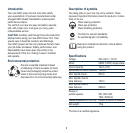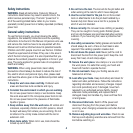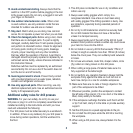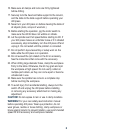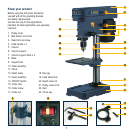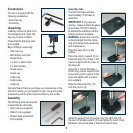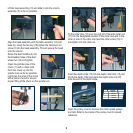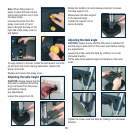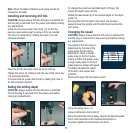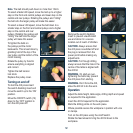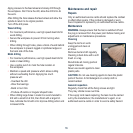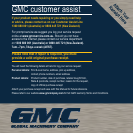5
15. Avoid unintentional starting. Always check that the
switch is in the OFF position before plugging in the tool
to the power supply. Do not carry a plugged in tool with
your finger on the switch.
16. Use outdoor rated extension cords. When a tool
is used outdoors, use only extension cords that are
intended for outdoor use and are so marked.
17. Stay alert. Watch what you are doing. Use common
sense. Do not operate a power tool when you are tired.
18. Check for damaged parts. Before using a tool, check
that there are no damaged parts. If a part is slightly
damaged, carefully determine if it will operate properly
and perform its intended function. Check for alignment
of moving parts, binding of moving parts, breakage
of parts, proper mounting and any other conditions
that may affect the operation of the tool. A part that is
damaged should be properly repaired or replaced by an
authorised service facility, unless otherwise indicated in
this Instruction Manual.
Defective switches must be replaced by an authorised
service facility. Do not use a tool if the switch does not
turn the tool on and off correctly.
19. Guard against electric shock. Prevent body contact
with grounded objects such as water pipes, radiators,
cookers and refrigerator enclosures.
20. Use only approved parts. When servicing, use only
identical replacement parts. Use an authorised service
facility to fit replacement parts.
Additional safety rules for drill presses
WARNING. For your own safety, do not try to use your
drill press or plug it in until it is completely assembled and
installed according to the instructions and until you have
read and understood the following:
1. Your drill press must be bolted securely to a workbench.
In addition, if there is any tendency for your drill press to
move during certain operations, bolt the workbench to
the floor.
2. This drill press is intended for use in dry conditions and
indoor use only.
3. Always wear safety goggles which comply to a
recognised standard. Use a face or dust mask along
with safety goggles if the drilling operation is dusty. Use
ear protectors, especially during extended periods of
operation.
4. Do not try to drill material too small to be securely held.
Do not drill material that does not have a flat surface
unless it is clamped securely.
5. Always keep hands out of the path of the drill bit. Avoid
awkward hand positions where a sudden slip could cause
your hand to move into the drill bit.
6. Do not install or use any drill bit that exceeds 175mm (7
inches) in length or extends more than 150mm (6 inches)
below the chuck jaws. They can suddenly bend outwards
or break.
7. Do not use wire wheels, router bits, shaper cutters, circle
(fly) cutters or rotary planers on this drill press.
8. When cutting a large piece of material make sure it is
fully supported at the table height.
9. Do not perform any operation freehand. Always hold the
workpiece firmly against the table so it will not rock or
twist. Use clamps or a vice for unstable workpieces.
10. Make sure there are no nails or foreign objects in the
part of the workpiece to be drilled.
11. Whenever possible, position the workpiece to contact
the left side of the column; if it is too short or the table is
tilted, clamp solidly to the table.
12. If the workpiece overhangs the table such that it will fall
or tip if not held, clamp it to the table or provide auxiliary
support.
13. Set the drill press to a speed appropriate to the job.
14. Do not start the drill press while the drill bit is touching
the workpiece.
15. When using a drill press vice, always fasten it to the
table.



